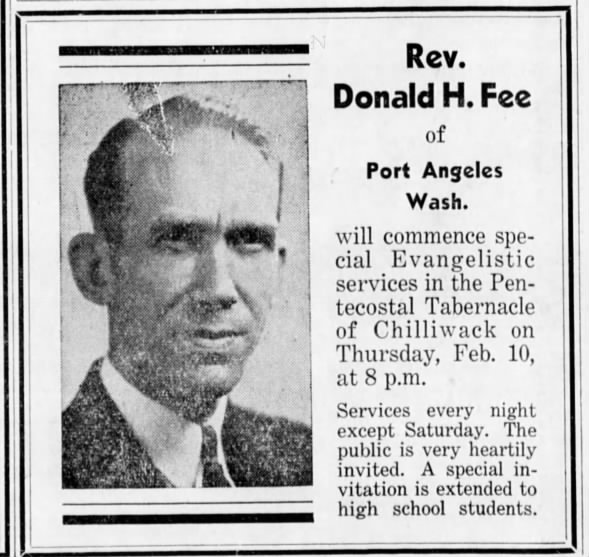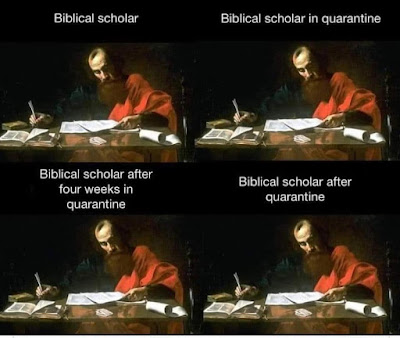Charismatic scholarship
Biblical scholars … theologians … historians … philosophers
Tuesday, November 8, 2022
My favorite 2022 book purchase
Wednesday, November 2, 2022
On the passing of Gordon D. Fee (1934 - 2022)
 |
| Regent College photo (taken in 2010) |
New Testament scholar Gordon D. Fee went to be with the Lord on Monday, October 25, 2022.
Biblical Interpretation (Gordon Fee) from Regent Audio on Vimeo.
Saturday, October 10, 2020
How Ben Witherington III came to be charismatic
Witherington, the Jean R. Amos Professor of New Testament for Doctoral Studies at Asbury Seminary, has written commentaries, a book about New Testament history, books about Jesus, and even novels. All of that and depth of his scholarship have resulted in him being recognized as one of the leading NT academics of our time.
Add to that - he's charismatic.
He told the backstory on his blog 13 years ago:
Though I have been a life long Methodist, for most of my adult life I have also been very involved in the life of the Spirit. This goes back to attending Gordon Fee's Bible study in his home with my wife to be in 1975 where I first heard speaking in tongues. Then there was the day I was at a healing and exorcism service in Tremont Temple in Boston and the next thing I knew, I was speaking in tongues. I need to tell you while of course there are always counterfeits when it comes to spiritual gifts, the genuine experience is simply one that comes unbidden and sweeps over you. Like grits on a southern breakfast plate, it just comes. And while you can stop it, its a pretty overwhelming experience. You don't have to be in an emotional state for it to happen. You don't have to be revved up by the praise band. You don't have to be praying for it--- it just comes. And why should this surprise us. The Holy Spirit is so much more powerful than we are and our little wills, and the Spirit does not want to be quenched by us as Paul reminds the Thessalonians in 1 Thess. 5.
You can read the entire blog post entitled, "Here Come the Pentecostals" at this link: http://benwitherington.blogspot.com/2007/01/here-come-pentecostals.html
Saturday, October 3, 2020
Saturday, September 26, 2020
"... Book by Book ..."
Today, I am featuring Fee and Stuart's similarly titled book, How to Read the Bible Book by Book: A Guided Tour, because if I could somehow mandate that all Christians read one book - besides the Bible - it would be "... Book by Book ...."
I've spent a lot of time - and money - in Christian bookstores and I have not seen a better book for explaining how the Bible should be read. Just as the title indicates, it's like having an expert take you on a tour(s) of the Bible.
Each tour for the Bible's 66 books is preceded by Orienting Data (info such as author, date, recipients, and so on), An Overview of the book, and Specific Advice for reading the book. The authors recommend that those three sections be read prior to actually reading the Biblical book being studied. Then, the section entitled, A Walk Through, is meant to be read alongside your reading of the Biblical text.
Here are four pages to whet your appetite (click on the images to enlarge them):
Saturday, September 19, 2020
Three audio lectures by Gordon Fee
NG: What books were formative for you when you were a student? Why were they so important and shaping?
SR: Books that I found formative include Baruch Halpern’s The First Historians, Roland deVaux’s Ancient Israel: Its Life and Institutions, and Fee and Stuart’s How to Read the Bible for All Its Worth. Each of these books directed me back to the original contexts of the biblical authors via historiography, archaeology, and genre-study. In the spirit of Jeannine Brown’s Scripture as Communication, each of these books challenged me to read the Bible as a communicative act from an ancient community, who had witnessed the mighty acts of God, to me. Each helped me, in the words of John Walton to recognize that although the Bible was written for me, it wasn’t written to me. And until I was able to engage the world of the original authors and audiences, I was not able to truly engage the Bible.
Saturday, September 12, 2020
Gordon Fee's life story - where to read about it
Fee's work as a scholar who happens to be Pentecostal - and vice versa - has not only opened the door for an entire generation of Pentecostal and charismatic scholars who want to take scholarship and their spirituality seriously. It has also opened the eyes of those not within a Pentecostal tradition to see that a faith that embraces the experiential dimension can also take seriously the role of scholarship.
The passion that marked the Assemblies movement in those early years often overshadowed textual accuracy, but this was not true of my father. He was passionate and accurate. I remember often sleeping in my father's study (which from time to time doubled as my bedroom during father's house remodeling or while entertaining guests). His study was filled with books pertaining to Scripture and the Christian walk. It never occurred to me that this was unusual for Assembly pastors until later on as I grew older it became evident to me that most pastors' studies paled in size compared to my father's. My father was the first scholar I had ever met, even though in those early years I didn't recognize it. Still his passion for truth and determination to dig down deep into the Scriptures to find the meaning of the text and apply it to believers rubbed off on me.
 Donald H. Fee (Feb 1944) Wed, Feb 9, 1944 – Page 10 · The Chilliwack Progress (Chilliwack, British Columbia, Canada) · Newspapers.com
Donald H. Fee (Feb 1944) Wed, Feb 9, 1944 – Page 10 · The Chilliwack Progress (Chilliwack, British Columbia, Canada) · Newspapers.com |
| THE FEE FAMILY - from left to right, Gordon's older sister, Donna; Gordon; his mother, Grace, and his father, Donald. Donna was three years older than Gordon. |










